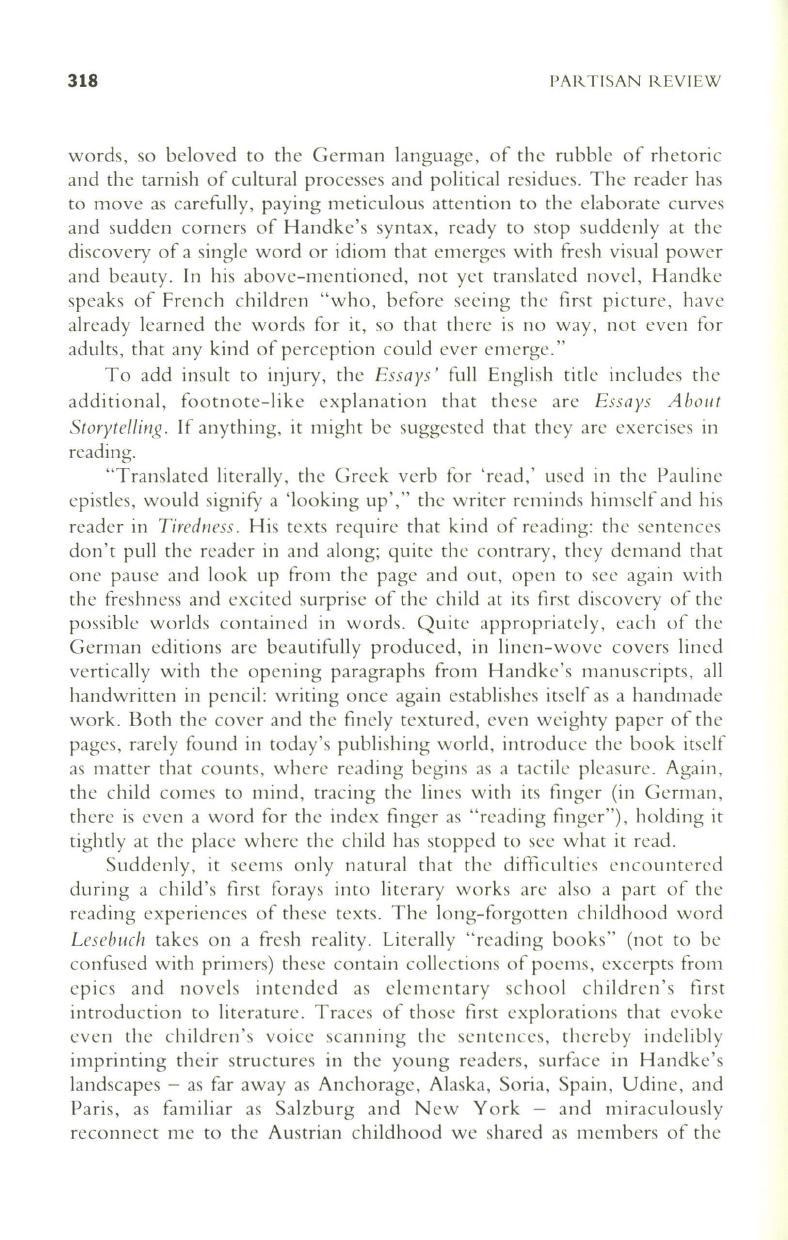
318
PAI~
TISAN REVIEW
words, so beloved to the German language, of the rubble of rhetoric
and the tarnish of cultural processes and political residues. The reader has
to move as carefully, paying meticulous attention to the elaborate curves
and sudden corners of Handke's syntax, ready to stop suddenly at the
discovery of a single word or idiom that emerges with fresh visual power
and beauty.
In
his above-mentioned, not yet translated novel, Handke
speaks of French children "who, before seeing the first picture, have
already learned the words for it, so that there is no way, not even for
adults, that any kind of perception could ever emerge."
To add insult to injury, the
Essays'
full English title includes the
additional, footnote-like explanation that these are
Essays Abollt
Storytelling.
If
anything, it might be suggested that they are exercises in
reading.
"Translated literally, the Greek verb for 'read,' used in the Pauline
epistles, would signifY a 'looking up'," the writer reminds himself and his
reader in
Tiredness.
His texts require that kind of reading: the sentences
don't pull the reader in and along; quite the contrary, they demand that
one pause and look up from the page and out, open to see again with
the freshness and excited surprise of the child at its first discovery of the
possible worlds contained in words. Quite appropriately, each of the
German editions are beautifully produced, in linen-wove covers lined
vertically with the opening paragraphs from Handke's manuscripts, all
handwritten in pencil: writing once again establishes itself as a handmade
work. Both the cover and the finely textured, even weighty paper of the
pages, rarely found in today's publishing world, introduce the book itself
as matter that counts, where reading begins as a tactile pleasure. Again,
the child comes to mind, tracing the lines with its finger (in German,
there is even a word for the index finger as "reading finger"), holding it
tightly at the place where the child has stopped to sec what it read.
Suddenly, it seems only natural that the difficulties encountered
during a ch ild 's first forays into literary works are also a part of the
reading experiences of these texts. The long-forgotten chi ldh ood word
Lesebuch
takes on a fresh reality. Literally "reading books" (not to be
confused with primers) these contain coll ections of poems, excerpts from
epics and novels intended as e lementary school children's first
introduction to literature . Traces of those first exp lorations that evoke
even the children's voice scanning the sentcnccs, thereby indelibly
imprinting their structures in the young readers, surface in Handke's
landscapes - as far away as Anchorage, Alaska, Soria, Spain, Udine, and
Paris, as familiar as Salzburg and New York - and miraculously
reconnect me to the Austrian ch ildhood we shared as members of the


